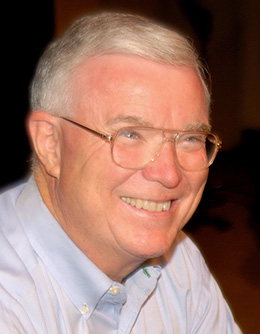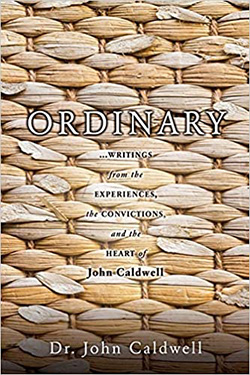By John Caldwell (adapted from his new book)
I am a pretty ordinary guy. I’m not dumb, but neither am I brilliant. While I love sports, I’m certainly not athletically gifted. I was a decent trumpet player in my high school and college days, but I was second chair, not first chair. I don’t light up a room when I enter it. Actually, I’m pretty much an introvert who, if given the choice, would sit in a chair in the corner and read a book rather than socialize. I’m not ugly, but neither would most consider handsome (my wife and daughter being the only people who would even be tempted to lie on that point). I love to sing, but I’m no vocalist.
Even when it comes to my calling in life, being a preacher, on a good day I might be better than average, but there are plenty of preachers I would far rather hear than me. As I said, I’m a pretty ordinary guy.
I have, however, been privileged to know personally some very gifted and talented men and women. I’m talking about people who are in no way ordinary. While I really want to call them by name, I fear that doing so would detract from the point I’m trying to make. But I have friends with loads of charisma who immediately become the center of attention when they enter a room.
I have studied under some of the most brilliant men to ever walk the earth. I count as close friends a number of men who are respected as among the finest and most effective preachers of my lifetime. I have friends who have an incredible gift for humor, others who are gifted administrators, and yet others who are outstanding vocalists. And while I’m not exceptionally gifted in any of those areas, that only means I’m like most people. And that doesn’t mean God can’t use us.
In Matthew 25, Jesus told a story we know as the parable of the talents. In the parable, the master was leaving on a lengthy trip and entrusted his wealth to three of his servants to invest for him while he was away. To the first servant he gave five talents (a large unit of money), he gave two talents to the second servant, and one talent to the third servant. As you probably know, the five-talent servant invested well and doubled what had been given to him. The same was true of the second; he was given two talents and he doubled it to four talents by the time his master returned. However, the servant given one talent was fearful of losing it, so he hid it and failed to produce any profit from it by the time his master returned. For this the third servant was soundly condemned.
In all honesty, there aren’t many five-talent people around. There are, however, lots of one-talent people and a number of two-talent people, and most of us fall somewhere in between. The point of Jesus’ story is that we all have been given something, and even ordinary guys can accomplish significant things for our Master if we will only use what we have been given.
I attended a gathering in which Josh McDowell asked a question that captured my attention: “If you could be anyone in the whole world, who would you choose to be?” I began to think of all the people I genuinely admire, all those with characteristics, talents, and abilities I wish I possessed. If I had the power to do so, there are a number of things about myself I would change. But as I thought about it, I came to a rather startling conclusion. It might sound prideful to some, but I assure you it is not. For if I could be anyone in the whole wide world . . . I would be me, for I’m the only me God made. And he had a purpose in making me who I am; I simply need to work at being the best me I can possibly be.
I may be an ordinary guy, a two-talent guy, but God has allowed me to experience some incredible things in my life. I may not be able to preach like, sing like, look like, think like, plan like, or inspire people like others who excel at these things. But I’ll tell you what I can do. I can work as hard or harder than anyone. I can be as faithful as anyone. I can love people as much as anyone. I can be all God made me to be as much as anyone. You can too!
I’ll never preach to millions like Billy Graham. I’ll never have the intellect of Dr. Lewis Foster, one of my grad school professors, and a Greek scholar who translated Luke and Acts for the New International Version of the Bible. I’ll never be able to make people laugh the way my friend Wayne Smith could. But I’ll tell you what I can do. I can love my wife, my kids, their spouses, and my grandsons. I can love the Lord. And I can make sure that when I preach, I never ask others to do what I’m unwilling to do. When I challenge people to give, I can make at least as big a sacrifice as I’m expecting them to make. When I urge people to share their faith, I can make sure I’m going and telling others about Jesus. When it comes to public worship, I can worship with the same enthusiasm and expressiveness I would want others to exhibit. And I can love the Lord with as much passion as anyone else.
The apostle Paul said over and over, “Be imitators of me” (1 Corinthians 4:16, all Scripture quotations are from the New American Standard Bible, 1995). He qualified that statement a few chapters later when he wrote, “Be imitators of me, just as I also am of Christ” (11:1). In Philippians 3:17, he said, “Join in following my example.” He put it this way in Philippians 4:9: “The things you have learned and received and heard and seen in me, practice these things.” Then in 2 Thessalonians 3:7 he wrote, “You yourselves know how you ought to follow our example.” And in verse 9, he offered himself “as a model for you, so that you would follow our example.” I believe the Lord wants all of us to live in such a way that we can say the same thing.
How did Jesus teach his disciples to pray? He did it by modeling prayer. How did he equip them to be servants? He knelt down and washed their feet, and then he said, “I gave you an example that you also should do as I did for you” (John 13:15). How did Paul equip the elders in Ephesus to properly shepherd the church? He set the example. You can read about it in Acts 20:17-38. Isn’t that the primary responsibility of a spiritual leader, that of setting a godly example? And you can do that whether you have five talents, two talents, or just one.
We all know about David, Moses, Daniel, Jonah, Samson, Noah, Peter, Stephen, and all the others in Hebrews 11. But they were all larger than life. Where are the average Joes and Janes, men and women not listed in “Who’s Who?” Where are the people who are long on faith but short on pedigree, people whose abilities are limited but who serve a God who is all-powerful? The truth is that they are also right there in the Bible.
They are Shiphrah and Puah, the two midwives who dared defy Pharaoh and thus saved the baby Moses. There was Bezaleel, a simple architect whom God commissioned with building the tabernacle. Being left-handed, I especially like Ehud who was used of God for no greater reason than that he was left-handed and available. How about Shamgar? He is mentioned only once in Scripture, yet God used him to kill 600 Philistines and save Israel. Asa was the son of godless parents, but he became a godly king. Tychicus was the courier who delivered Paul’s holy telegrams, hardly a glamourous job. Hushai was a covert counselor for David who successfully infiltrated enemy ranks. Epaphroiditus served Paul and was called by him a true brother, a faithful worker, and a courageous soldier.
All of these listed were comparative nobodies, just ordinary people, but they were nobodies “of whom the world is not worthy.” The fact is, God chooses ordinary people more often than not. Maybe that’s because there are so many of us from whom he can choose.
_ _ _
This article is adapted from chapter 39 of Ordinary . . . Writings from the Experiences, the Convictions, and the Heart of John Caldwell, published this month. The book is available from Xulon Press, Amazon, Barnes & Noble, and other booksellers.
John Caldwell served as senior pastor of Kingsway Christian Church in Indianapolis from 1974 to 2010. He remains involved in ministry as a guest speaker and interim minister, and he serves with three mission boards as well as a part-time field representative for Christian Arabic Services.



I am so thankful that you are the best “you” on earth! I can’t wait to get your book!